- Home
- Haruki Murakami
South of the Border, West of the Sun Page 7
South of the Border, West of the Sun Read online
Page 7
I bit my lip. “What do you mean?”
“Most of the kids who live in that apartment building are afraid of her.”
“Afraid?” I repeated. I looked at him, uncomprehending. He must have chosen the wrong words. “What do you mean—afraid of her?”
“Hey, how about we call it a wrap? I didn’t really want to get into this anyway.”
“Wait a second—what does she do? Does she say things to the kids?”
“She doesn’t say anything to anybody. Like I said before.”
“So kids are afraid of her face?”
“That’s right,” he said.
“Does she have a scar or something?”
“No scars.”
“Well, then, what are they afraid of?”
He finished his whiskey and placed the glass on the counter. And looked at me for a good long time. He appeared flustered and more than a little confused. But something else was in his expression. I could catch a trace of his face as it was back in high school. He looked up for a while, staring off into the distance as if watching a stream flowing off and away. Finally he spoke. “I can’t explain it well; besides, I don’t want to. So don’t ask me any more, okay? You’d have to see it with your own eyes to understand. Someone who hasn’t actually seen it won’t understand anyway.”
I nodded, saying nothing more, just sipping at my vodka gimlet. His tone was calm, but any further inquiries I knew he would turn down point-blank.
He started to talk about the two years he worked in Brazil. You won’t believe it, he said, but I ran across one of my junior high classmates in São Paulo, of all places. Working at Toyota as an engineer.
His words blew right by me. When he left, he clapped me on the shoulder. “Well, the years change people in many ways, right? I have no idea what went on between you and her back then. But whatever it was, it wasn’t your fault. To some degree or other, everyone has that kind of experience. Even me. No joke. I went through the same thing. But there’s nothing you can do about it. Another person’s life is that person’s life. You can’t take responsibility. It’s like we’re living in a desert. You just have to get used to it Did you see that Disney film in elementary school–The Living Desert?”
“Yeah,” I answered.
“Our world’s exactly the same. Rain falls and the flowers bloom. No rain, they wither up. Bugs are eaten by lizards, lizards are eaten by birds. But in the end, every one of them dies. They die and dry up. One generation dies, and the next one takes over. That’s how it goes. Lots of different ways to live. And lots of different ways to die. But in the end that doesn’t make a bit of difference. All that remains is a desert.”
He went home, and I sat alone at the counter, drinking. After the bar was closed for the night, after all the customers had gone, even after the staff had straightened up the place and gone home themselves, I sat there, alone. I didn’t want to go home right away. I phoned my wife and told her I had something to take care of at work and would be late. I turned out the lights and sat in the dark, drinking whiskey. Too much trouble to get ice out, so I drank it straight.
Everyone just keeps on disappearing. Some things just vanish, like they were cut away. Others fade slowly into the mist. And all that remains is a desert.
When I left the bar, just before dawn, a light rain was falling on the main street in Aoyama. I was exhausted. Soundlessly, the rain soaked the rows of tall buildings, standing there like so many gravestones. I left my car in the bar’s parking lot and walked home. On the way, I sat down on a guardrail and watched a large crow that was cawing from the top of a traffic signal. The four a.m. streets looked shabby and filthy. The shadow of decay and disintegration lurked everywhere, and I was part of it. Like a shadow burned into a wall.
8
For ten days or so after the feature article with my name and photo appeared in Brutus, old acquaintances dropped by the bar to see me. Junior high and high school classmates. Up till then, I’d always wondered who on earth would possibly read all those magazines piled up at the front of every bookstore. But once I myself was featured in one, I discovered that more people than I’d ever imagined were glued to magazines. In hair salons, banks, coffee shops, trains, every place imaginable, people had magazines open in front of them, as if possessed. Maybe people are afraid they’ll have nothing to kill time with, so they just pick up whatever happens to be on hand. Beats me.
Anyway, I can’t say it was the most thrilling thing in the world to see these faces from the past. Not that I didn’t like talking with them. It put me in a pleasant, nostalgic mood. And they seemed happy to see me. But frankly I couldn’t care less about the subjects they brought up. How our old hometown had changed, what other classmates were up to now. As if I cared. I was too far removed from that place and time. Besides, everything they talked about brought back memories of Izumi. Every mention of my hometown made me picture her alone in that bleak apartment. She’s no longer attractive, my friend had said. The kids are afraid of her. I couldn’t get those two lines out of my head. And the fact that Izumi never forgave me.
I’d just wanted to give the bar a little free publicity, but not long after the article came out, I began seriously to regret allowing the magazine to report on it. The last thing I wanted was for Izumi to see the article. How would she feel if she saw me, blithely living a happy life, seemingly unscarred by our past?
A month later, though, the cast of old friends had petered out. Guess that’s one point in favor of magazines: You have your moment of fame, then poof! you’re forgotten. I breathed a sigh of relief. At least Izumi didn’t show. She wasn’t a Brutus subscriber, after all.
But a couple of weeks after that, after all the hubbub of the article had been forgotten, the last friend showed up.
Shimamoto.
It was the evening of the first Monday in November. And there, at the counter of the Robin’s Nest (the name of the jazz club, the title of an old tune I liked), she sat, quietly sipping a daiquiri. I was at the same counter, three seats down, completely oblivious to the fact that it was her. I’d observed that an extremely beautiful woman had come into the bar, but that was all. A new customer; I made a mental note. If I had seen her before, I would have remembered; that’s how outstanding she was. Before long, I figured, whoever she was waiting for would show up. Not that women never drank alone in the bar. Some single women seem to expect that men will put the moves on them; others seem more to be hoping for it I could always tell which was which. But a woman this beautiful would not be out drinking alone. A woman like this wasn’t the type to be thrilled by men making advances. She’d just find it a pain.
That’s why I wasn’t paying much attention to her. Sure, I checked her out when she first came in and gave her a glance every once in a while. She wore just a touch of makeup, and a pricey-looking outfit–a blue silk dress, with a light-beige cashmere cardigan. A cardigan as delicate-looking as an onion skin. And on the counter she’d placed a handbag that matched her dress perfectly. I couldn’t guess her age. Just the right age, was all I could say.
Her beauty took your breath away, but I didn’t figure her for a movie star or a model. Those types did frequent my bar, but you could always tell they were conscious of being on public display, the unbearable meness of being clinging to the air around them. But this woman was different. She was completely relaxed, totally at ease with her surroundings. She rested her chin in her hands on the counter, absorbed in the piano trio’s music, all the while sipping her cocktail as if lingering over a particularly well-turned phrase. Every few minutes, she glanced in my direction. I could sense it, physically. Though I was positive she wasn’t really looking at me.
I had on my usual outfit—Luciano Soprani suit, Armani shirt and tie. Rossetti shoes. Believe it or not, I wasn’t the type to worry about clothes. My basic rule was to spend the bare minimum on them. Outside of work, jeans and a sweater did me fine. But I did have my own little philosophy of doing business: I wore the kind of clothes I w
anted my customers to wear. Doing so, I found, put the staff just that much more on their toes and created the sort of elevated mood I was aiming for. So every time I came to the bar, I made absolutely sure to wear a nice suit and tie.
There I sat, then, checking to make sure the cocktails were mixed correctly, keeping an eye on the customers, and listening to the piano trio. At first the bar was fairly packed, but after nine it started raining, and the number of customers tailed off. By ten only a handful of the tables were occupied. But the woman at the counter was still there, alone with her daiquiris. I started to wonder about her more. Maybe she wasn’t waiting for someone, after all. Not once did she glance at her watch or at the entrance.
Finally she picked up her bag and stepped down from her stool. It was nearly eleven. If you wanted to take the subway home, now was the time to get a move on. Slowly, ever so casually, though, she made her way over to me and sat on the adjacent stool. I caught a faint whiff of perfume. Settling down on the stool, she took a pack of Salems from her bag and put one in her mouth. I caught all this out of the corner of my eye.
“What a lovely bar,” she said to me.
I looked up from the book I’d been reading and looked at her uncomprehendingly. Just then something hit me—hard. As if the air suddenly lay heavy on my chest.
“Thanks,” I said. She must have known I was the owner. “I’m happy you like it.”
“I do, very much.” She looked deep into my eyes and smiled. A wonderful smile. Her lips spread wide, and small, fetching lines formed at the corners of her eyes. Her smile stirred deep memories—but of what?
“I like your music too.” She pointed to the piano trio. “Do you have a light?” she asked.
I had neither matches nor a lighter. I called to the bartender and had him bring over a book of the bar’s matches. And I lit her cigarette for her.
“Thanks,” she said.
I looked at her straight on. And I finally understood.
“Shimamoto,” I rasped.
“It took you long enough,” she said after a while, a funny look in her eyes. “I thought maybe you’d never notice.”
I sat there speechless, gawking at her as though I were in the presence of some high-tech precision machinery I’d only heard rumors of. It was indeed Shimamoto in front of me. But I couldn’t yet grasp the reality of it. I’d been thinking of her for so very, very long. And I was sure I’d never see her again.
“I love your suit,” she said. “It’s quite becoming.”
I nodded wordlessly. The words just wouldn’t flow.
“Know something, Hajime? You’re much handsomer than you used to be. And a lot better built.”
“I swim a lot,” I finally managed to say. “I started in junior high, and I’ve been swimming ever since.”
“Swimming looks like so much fun. I’ve always thought so.”
“It is. But if you practice, anyone can learn, you know,” I said. As soon as the words left my mouth, I remembered her leg. What the hell are you talking about? I asked myself. I was flustered, fumbling for the right thing to say. But the words eluded me. I rummaged around in my suit pockets for a pack of cigarettes. And then remembered. I’d quit smoking five years before.
Shimamoto watched me silently. She raised her hand and ordered another daiquiri, giving the biggest smile. A truly beautiful smile. The kind of smile that made you want to wrap up the whole picture for safekeeping.
“You still like blue, I see,” I said.
“Yes. I always have. You have a good memory.”
“I remember almost everything about you: the way you sharpen your pencils, the number of lumps of sugar you put in your tea.”
“And how many would that be?”
“Two.”
She narrowed her eyes a bit and looked at me.
“Tell me something, Hajime,” she began. “That time about eight years ago—why did you follow me?”
I sighed. “I couldn’t tell if it was you or not. The way you walked was exactly the same. But there was also something about it that didn’t seem like you. I tailed you because I wasn’t sure. Tailed isn’t the right word. I was just looking for the right moment to talk with you.”
“Then why didn’t you? Why didn’t you just come right out and see if it was me? That would have been faster.”
“I don’t know, myself,” I answered. “Something held me back. My voice just wouldn’t work.”
She bit her lip a little. “I didn’t notice then that it was you. All I could think was that someone was following me, and I was afraid. Really. I was terrified. But once I got in the cab and had a chance to calm down, it came to me. Could that have been Hajime?”
“Shimamoto-san, I was given something then. I don’t know what relationship you have with that person, but he gave me–”
She put her index finger to her lips. And lightly shook her head. Let’s not talk about that all right? she seemed to be saying. Please, don’t ever bring it up again.
“You’re married?” she asked, changing the subject
“With two kids,” I replied. “Both girls. They’re still little.”
“That’s great. I think daughters suit you. I can’t explain why, but they do.”
“I wonder.”
“Yes—somehow.” She smiled. “But at least you didn’t have an only child.”
“Not that I planned it. It just turned out that way.”
“What does it feel like? I wonder. To have two daughters.”
“Frankly, a little strange. More than half the children in my older girl’s nursery school are only children. The world’s changed since we were kids. In the city, only children have become more the rule, not the exception.”
“You and I were born too soon.”
“Maybe so,” I said. “Perhaps the world’s drawing closer to us. Sometimes when I see the two of them playing together at home, I’m amazed. A whole other way of raising children. When I was a child, I always played alone. I thought that was how all kids played.”
The piano trio wound up its version of “Corcovado,” and the customers gave them a hand. As always, as the night wore on, the trio’s playing grew warmer, more intimate. Between numbers the pianist drank red wine, while the bassist smoked.
Shimamoto sipped her cocktail. “You know, Hajime, I wasn’t at all sure at first whether I should come here. I agonized over it for nearly a month. I found out about your bar in some magazine I was leafing through. I thought it must be a mistake. You of all people running a bar! But there was your name, and your photograph. Good old Hajime from the old neighborhood. I was happy I could see you again, even if it was in a photograph. But I wasn’t sure if meeting you in person was a good idea. Maybe it was better for both of us if we didn’t. Maybe it was enough knowing you were happy and doing well.”
I listened to her in silence.
“But since I knew where you were, it seemed like a waste not to at least come see you once, so here I am. I sat down over there and watched you. If he doesn’t notice me, I thought, maybe I’ll just leave without saying anything. But I couldn’t stand it. It brought back so many memories, and I had to say hello.”
“Why?” I asked. “I mean, why did you think it was better not to meet me?”
Tracing the rim of her cocktail glass with her finger, she was lost in thought “I thought if I met you you’d want to know all about me. Whether I was married, where I lived, what I’d been up to, those kinds of things. Am I right?”
“Well, I’m sure those would come up.”
“Of course.”
“But you’d rather not talk about those?”
She smiled perplexedly and nodded. She had a million different variations on a smile. “That’s right. I don’t want to talk about those things. Please don’t ask me why. I just don’t want to talk about myself. I know it’s unnatural, that it’s like I’m putting on airs, trying to be a mysterious lady of the night or something. That’s why I thought maybe I shouldn’t see you. I didn�
�t want you to think I was some strange, conceited woman. That’s one reason I didn’t want to come here.”
“And the other?”
“I didn’t want to be disappointed.”
I looked at the glass in her hand. I looked at her straight shoulder-length hair and at her nicely formed thin lips. And at her endlessly deep dark eyes. A small line just above her eyelids caused her to look thoughtful. That line made me imagine a far-off horizon.
“I used to like you very much, so I didn’t want to meet you just to be disappointed.”
“Have I disappointed you?”
She shook her head slightly. “I was watching you from over there. At first you looked like somebody else. You were so much bigger with a suit on. But when I looked closer, I could make out the Hajime I used to know. Do you realize that your movements have hardly changed since you were twelve?”
“I didn’t know that.” I tried to smile but couldn.’t
“The way you move your hands, your eyes, the way you’re always tapping something with your fingertips, the way you knit your eyebrows like you’re displeased about something—these haven’t changed a bit. Underneath the Armani suit it’s the same old Hajime.”
“Not Armani,” I corrected her. “The shirt and tie are, but the suit’s not.”
She smiled at me.
“Shimamoto-san,” I began. “You know, I wanted to see you for the longest time. To talk with you. I had so many things I wanted to tell you.”
“I wanted to see you too,” she said. “But you never came. You realize that, don’t you? After you went off to junior high in another town, I waited for you. Why didn’t you come? I was really sad. I thought you’d made new friends in your new place and had forgotten all about me.”
Shimamoto crushed out her cigarette in the ashtray. She had clear lacquer on her nails. They were like some exquisitely made handicraft, shiny but understated.

 Sputnik Sweetheart
Sputnik Sweetheart Dance Dance Dance
Dance Dance Dance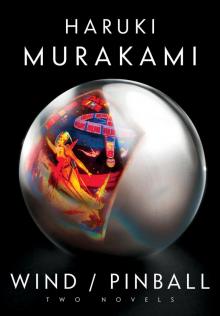 The Wind (1) and Up Bird Chronicle (2)
The Wind (1) and Up Bird Chronicle (2) Blind Willow, Sleeping Woman
Blind Willow, Sleeping Woman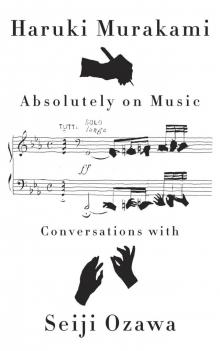 Absolutely on Music: Conversations With Seiji Ozawa
Absolutely on Music: Conversations With Seiji Ozawa Norwegian Wood
Norwegian Wood South of the Border, West of the Sun
South of the Border, West of the Sun Kafka on the Shore
Kafka on the Shore Men Without Women
Men Without Women After Dark
After Dark Hard-Boiled Wonderland and the End of the World
Hard-Boiled Wonderland and the End of the World 1q84
1q84 The Wind-Up Bird Chronicle
The Wind-Up Bird Chronicle Underground: The Tokyo Gas Attack and the Japanese Psyche
Underground: The Tokyo Gas Attack and the Japanese Psyche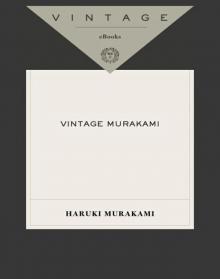 Vintage Murakami
Vintage Murakami The Elephant Vanishes: Stories
The Elephant Vanishes: Stories Colorless Tsukuru Tazaki and His Years of Pilgrimage
Colorless Tsukuru Tazaki and His Years of Pilgrimage First Person Singular
First Person Singular After the Quake
After the Quake A Wild Sheep Chase
A Wild Sheep Chase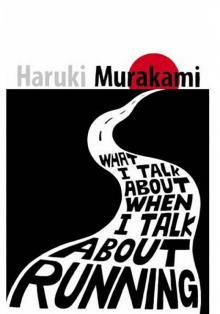 What I Talk About When I Talk About Running
What I Talk About When I Talk About Running Birthday Girl
Birthday Girl The Elephant Vanishes
The Elephant Vanishes Norwegian Wood (Vintage International)
Norwegian Wood (Vintage International)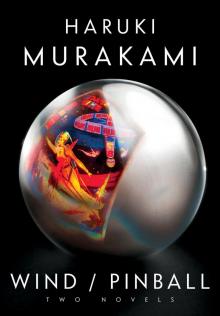 Wind/Pinball
Wind/Pinball Norwegian Wood Vol 1.
Norwegian Wood Vol 1. Underground
Underground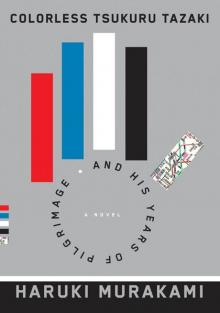 Colorless Tsukuru Tazaki and His Years of Pilgrimage: A novel
Colorless Tsukuru Tazaki and His Years of Pilgrimage: A novel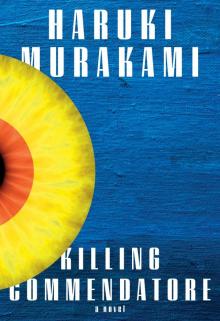 Killing Commendatore
Killing Commendatore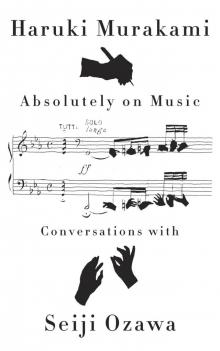 Absolutely on Music
Absolutely on Music